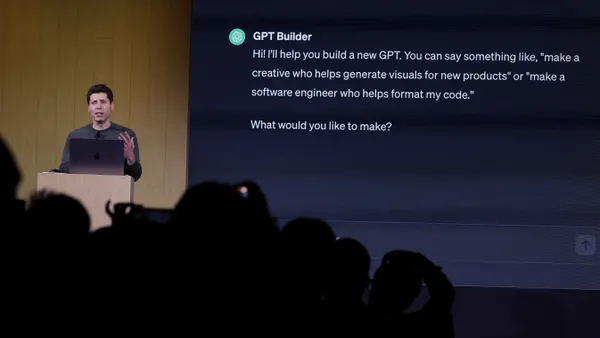The holiday season only amplifies some of the biggest issues for big box stores. Retention and the rising demand for the development of new talent, including supply chain managers and tech-oriented personnel, are top of mind for everyone. But such talent is hard to come by in this market — and the risks of failing to keep up are especially high this year, thanks to 3.7% unemployment.
So what are the country's biggest employers to do? Walmart took a development program previously in place more for "reputation" than for impact, according to Ellie Bertani, Walmart’s director of HR strategy and innovation, and revamped it through a partnership with Guild Education, a rising star in the education benefits field.
Guild Education provides employers and their workers with access to university courses as well as a mentorship program specifically designed to keep hourly workers on track with their development goals. Employee costs vary, but Walmart workers pay $1 a day to participate.
That accessibility is a cornerstone of the new benefit — and key to getting employees to participate at all. HR Dive spoke with Bertani about the program and what it means for the future of Walmart and for the future of work. The following conversation has been edited for length and clarity.
HR DIVE: Why did you opt to partner with Guild Education?
ELLIE BERTANI: We embarked on this journey ourselves in 2017 because we wanted to step back and re-evaluate education as a benefit within Walmart and how we could both do some really innovative things in this space, and not innovation for itself but because we had a more traditional education benefits program which was really centered more around reputation rather than true impact on associates. I think we were in a position that many are in, in that respect. We, in two ways, were really looking to change our practice.
One is, we started becoming very interested in the strategic impact of completion and not just getting the educational benefits, but realizing that the true value of those benefits are only realized for the company if an associate gets all the way through to completion of their high school diploma or their college degree. And that if someone begins a program and doesn't finish, it's not the true value for that employee and it's not the true value for the company where we really want to garner the skills that we're investing in, and retention and all the other potential benefits that come from a benefit like this.
The second was, we were really interested in integrating more closely internal training with external education benefits at Walmart ... and we were trying to be creative as we thought about that. And through those conversations, we got interested in Guild because our interests were really aligned. They had curated a strong network of proven institutions that serve adult learners in particular.
We know, particularly with our working associate base, that these are not traditional college students. We often think of the 18 to 22 year olds, but the needs of adult learners are significantly different.
Guild really provided the strongest analytics form integrations that we saw out in the industry. The amount of data that can be harnessed and utilized both by coaches and also by Walmart to make sure associates persist through their studies and that we can uncover the blocks we may be putting in place and rectify those really made it a strong value proposition for us.
A lot of universities have a coaching element, but this, because it has the perspective of the worker and the learner, is really effective. Now, a lot of this is based on assumptions we are making, so part of our strategy has been to make sure we have an independent third-party analysis done over the first few years to ensure we are getting the value out of it that we anticipate.
Did anything come up that shocked you while considering these barriers?
BERTANI: I don't know that there have been any major surprises. We are starting to uncover some of the barriers and put plans in place to mitigate them. As an example, book reimbursement is a really important thing that we nail down and get done quickly. And it sounds like kind of a minor thing but the [payment] associates need to make for books can be in the hundreds of dollars, and for associates in our world, that can be really significant. So putting in place a rapid way for associates to get reimbursed so they don't have to wait multiple paychecks and have that risk hanging over their head has been really important for us.
And actually as we look forward, we're exploring options for minimizing those book costs by maybe thinking of innovative partnerships in that space as well, because we know that can be a significant barrier of entry for associates. So that's one example. As we go through this process, we will find others that are not just on the front side of accessing but of persistence as well.
Why now? What about this moment makes the program really work for you?
BERTANI: Part of it is related to the broader conversation happening in many industries around the future of work. What are the skills we're going to be needing in the future? We want to be thoughtful about helping associates prepare for the new jobs that are going to be available in the future should they want to advance their careers in those spaces.
So one of the things we've tried to do is be very selective about the fields we're offering. It's not an open field of any degree you want. For us, our current focus is on business management or office management degrees or on supply chain degrees. Because those we know are going to be growing skill needs in our company. I think as we move forward we're also going to be looking at other types of skills, like IT certificates and things like pharmacy tech that are important to our business. But it's really about being selective and focused to achieve those future-of-work goals.
And that's one of the reasons this has been coming up at this point in time in particular. I think the other is just a broader realization that, for us, opportunity and upward mobility has been a guiding principle since day one. We're still a company where 75% of our salaried managers have come from the hourly ranks and we're really proud of that path to opportunity. And this felt like, if we were going to pick benefits to invest in and lean on, education is sort of a win-win for us and the associate.
Why, in your opinion, is that something employers feel they have to get involved in, even as automation erases some of the jobs they currently have? I find that call for responsibility really interesting.
BERTANI: I think it's partly what you just said. I think automation is coming to some jobs, so how do we invest in associates' skills in ways and areas we know aren't likely to be automated? Human judgment and decision-making and problem solving. A lot of those will be supplemented and helped with machine learning and things like that, but some of those core elements will never go away, so how do we make sure people are prepared to move away from those task-level jobs to those higher-order jobs so they don't end up in a bad place.
Preparing for the jobs of the future ... what does that look like to you? What are these jobs?
BERTANI: I think honestly no one has a great crystal ball. There are some areas where we believe we'll be seeing more; supply chain is a great example. Health and wellness could be an expanding area, but it's hard to say. I do think we can say there are certain core capabilities or skills that we know won't be automated away.
I think as the clarity comes with the three-, five-, 10-year plans, then we might be able to get even more specific, which is why the degrees are fairly general right now.
We are super pleased with the relationship with [Guild] and really excited about where it will take us in the future. We're really excited to be with such an innovative partner who's willing to innovate alongside us.













